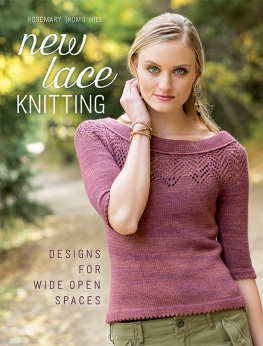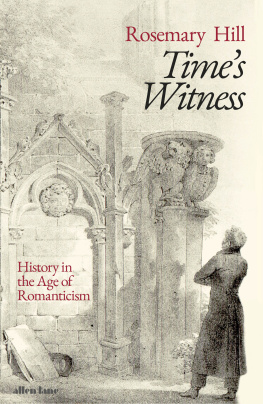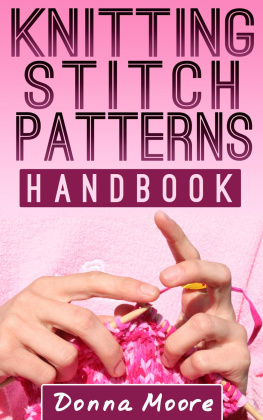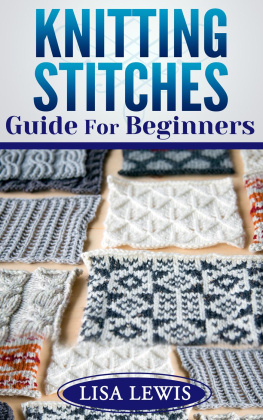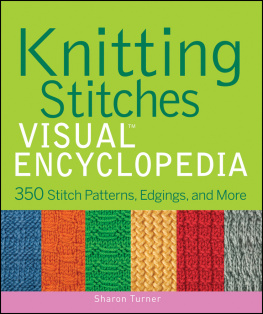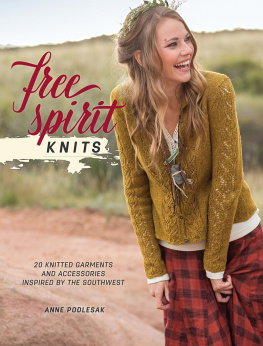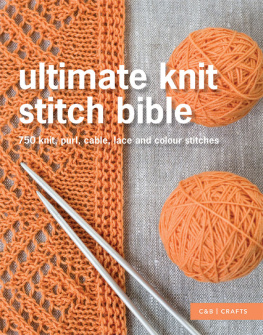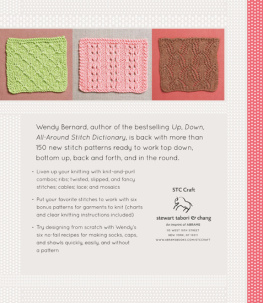Rosemary Hill - New Lace Knitting
Here you can read online Rosemary Hill - New Lace Knitting full text of the book (entire story) in english for free. Download pdf and epub, get meaning, cover and reviews about this ebook. publisher: F+W Media, genre: Home and family. Description of the work, (preface) as well as reviews are available. Best literature library LitArk.com created for fans of good reading and offers a wide selection of genres:
Romance novel
Science fiction
Adventure
Detective
Science
History
Home and family
Prose
Art
Politics
Computer
Non-fiction
Religion
Business
Children
Humor
Choose a favorite category and find really read worthwhile books. Enjoy immersion in the world of imagination, feel the emotions of the characters or learn something new for yourself, make an fascinating discovery.
- Book:New Lace Knitting
- Author:
- Publisher:F+W Media
- Genre:
- Rating:4 / 5
- Favourites:Add to favourites
- Your mark:
- 80
- 1
- 2
- 3
- 4
- 5
New Lace Knitting: summary, description and annotation
We offer to read an annotation, description, summary or preface (depends on what the author of the book "New Lace Knitting" wrote himself). If you haven't found the necessary information about the book — write in the comments, we will try to find it.
New Lace Knitting — read online for free the complete book (whole text) full work
Below is the text of the book, divided by pages. System saving the place of the last page read, allows you to conveniently read the book "New Lace Knitting" online for free, without having to search again every time where you left off. Put a bookmark, and you can go to the page where you finished reading at any time.
Font size:
Interval:
Bookmark:



For as long as I can remember, Ive been fascinated by patterns, both human-made and natural. My mother told me that, as a child, I would trace the grain in wood and the patterns in my grandmothers crochet, and talk to them as if they were old friends. And I know that my early years with my grandmotherwatching her tiny hook move dexterously to create lacy stitches in fine cotton threadwere what ultimately led to my fascination with first, knitting, then lace knitting. Although I learned to crochet years before I learned to knit (after begging my mother incessantly for lessons), my deepest love was always the neat and tidy knitted stitches arranged perfectly, one on top of the otherso very orderly.
Fast forward to later in life. After college and a job, after I met my husband and had a child, I began knitting again. And then...I found the Internet knitting community. What riches! Colors, patterns, traditions, techniques! I devoured it all ravenously, a basically self-taught and starving knitter turned loose in a candy shop of new ideas and yarns. And I began knitting lace. To this day, I have never gotten over my love affair with lace; the geometric patterns of positive and negative space entrance me. I hope my grandmother would look at me today, smile her knowing little smile, and approve.
For years, this book has been a tiny pinpoint of an idea niggling in the back of my mind. As I became more familiar with lace knitting, I became more and more fascinated with the way lace patterns were constructed. I loved how the placement of increases and decreases could alter a pattern, perhaps making it wave, and how changes in the types of decreases could transform the look of a pattern so completely. I knitted and knitted. First, I used other peoples designs; then, I began to design my own pieces incorporating lace. And now, here we are.
This book is a collection of themes and variations. The lace patterns are traditional; not new by any means. But I have used them to put together a collection of lace garments and accessories that can be worn today, and any day. With different weights and types of yarn, varied placement and amounts of lace patterning, and differing constructions, this collection will, I hope, kindle my love of lace in you as well.
I have a simple overall philosophy for lace knitting, and, in fact, for all knitting: Enjoy yourself.
Of course, that doesnt mean the same to everyone. Im an If youre going to do it, do it right kinda gal. Yes, Im a perfectionist.
I want all of my stitches to be lovely and even; I rip and reknit all the time. I use certain increase and decrease schemes in my designs only after trying numerous ones to choose the best. Even before I began designing my own knitwear, I had never ever knitted a pattern that I didnt change in some way. And because I need to know how a pattern will look and could look with a variation, I swatch. I also wash and block my swatches. If theyre lace swatches, I pin them out. I let them sit around and spring back to their resting state. Then I measure them. I may even obsess over them a little.
But I know that everyone knits a little differently, and everyone knits for different reasons. Different things bring different people pleasure. And yesI am using the word different a whole heck of a lot. Because I know that all knitters make their own choices, the following section is designed to help you make informed decisions about what you want to pay attention to and what you dont. You need to know what youre not interested in doing. If youve knitted lace before, this section may repeat what you already know, but I think its worth reading all the same.
When I began teaching knitters about lace knitting, I created a sheet called Romis Golden Rules. Heres the expanded and annotated version.
This is the first rule because its imperative that you swatch, then wash and block the swatch, especially for lace garments that need to fit in a particular way. Blocking can change lace gauge so drastically that the 2" (5 cm) square you knitted can turn into a 6" (15 cm) square. If youre knitting a shawl, the exact gauge isnt as important, and the shawl may still be wearable. But if its a sweater, instead of fitting your own frame, it may be a better fit for the neighbors horse. The more open space thats in a pattern, the more the needle size, yarn weight, and fiber composition will affect the finished and blocked project.
Theres another reason, too, to dress your swatchlace looks terrible before its blocked. For all its final beauty, theres nothing more bedraggled than an unblocked piece of lace. And some fibers (such as baby alpaca) look even worse than others. If you have a lovely blocked swatch to look at while knitting, youll believe that the magic of blocking will happen for you, even though its almost unimaginable before it happens.
Use yarn that you absolutely love to knit and a pattern youre gaga over. Every skein of yarn used for the projects in this book was a sensual pleasureto see and to touch. If I didnt enjoy the yarn or the color, I didnt use it. In fact, I was crushed to have to ask for help in knitting the samples in this book because I wanted to fondle every little bit of every skein.
The needles you use to knit lace are also extremely important. They should always feel comfortable in your hands. If theyre uncomfortable, you may tense up and change your gauge, and you certainly wont enjoy the process. Most knitters prefer pointy tips for lace knitting, but its a personal choice.
Youll need T-pins (hundreds of them) for blocking. Invest in high-quality stainless-steel T-pins that are uniformly smooth (without burrs). Cheap pins may snag or leave marks on your lovely lace and may react with any natural dyes in your yarn.
Blocking wiresboth straight and flexibleare huge time-savers, and they allow more accurate blocking. When you block a large lace piece, youll need to move and stretch the fabric a fair amount. Blocking wires will keep you from having to pin and unpin over and over again.
A good system of blocking squares will help you pin your piece to square. Otherwise, the amazingly stretchy and malleable lace fabric may end up rather lopsided.
If you can manage it, purchase a blocking horse (also called a woolly board), a wooden frame that forms a torso used to block traditional Fair Isle sweaters. I used it for the for absolutely perfect results. I wouldnt part with mine.
Font size:
Interval:
Bookmark:
Similar books «New Lace Knitting»
Look at similar books to New Lace Knitting. We have selected literature similar in name and meaning in the hope of providing readers with more options to find new, interesting, not yet read works.
Discussion, reviews of the book New Lace Knitting and just readers' own opinions. Leave your comments, write what you think about the work, its meaning or the main characters. Specify what exactly you liked and what you didn't like, and why you think so.

